Pinarello Grevil gravel bike review
The Grevil mixes features from the Dogma with a proper mixed terrain spec
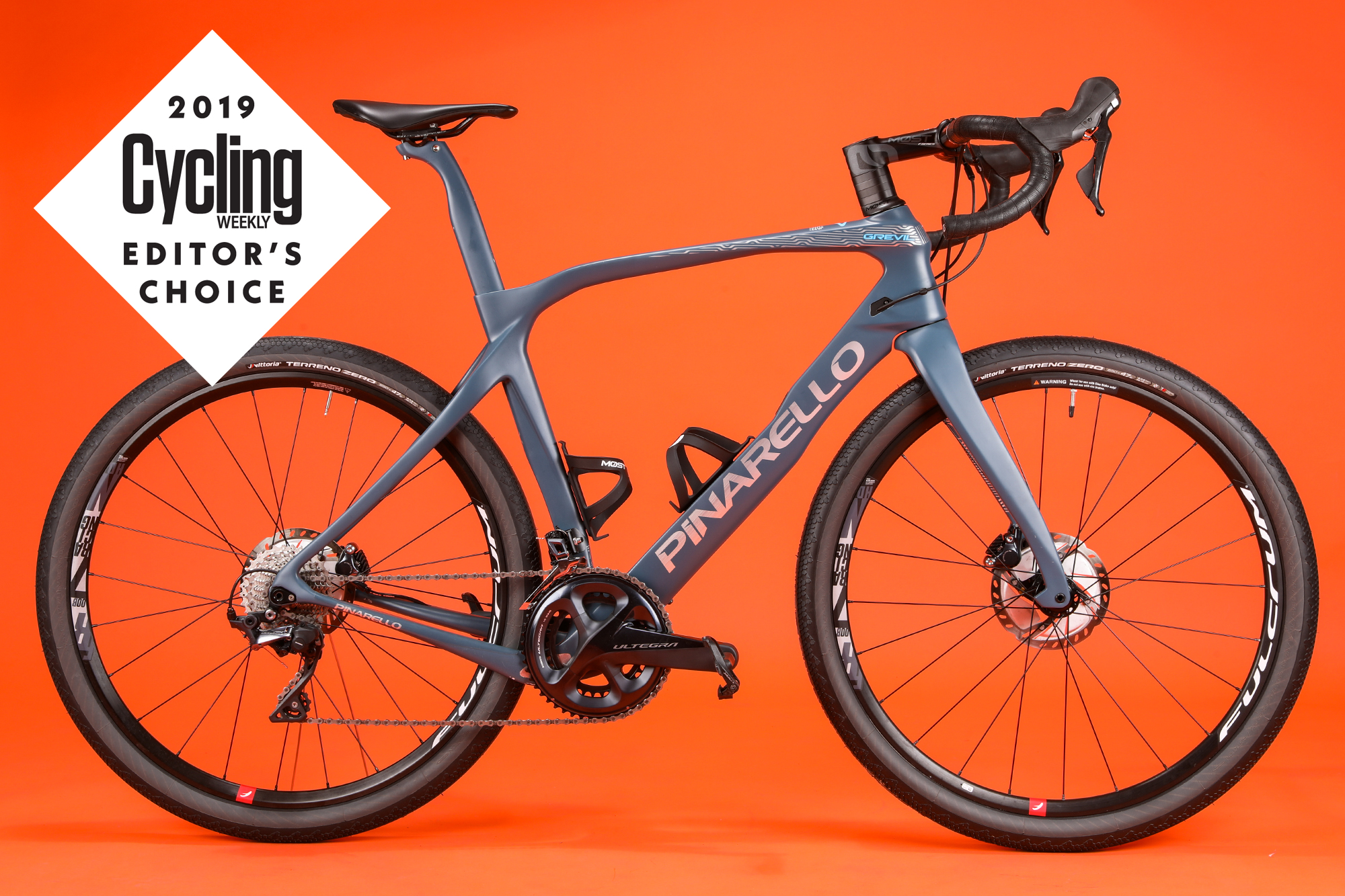
The Pinarello Grevil has the flashy aero looks of the brand’s top-end bikes. But it adds proper off road competence, to let you go where no Pinarello ought to be. It’s great fun to ride and no slouch on tarmac either.
-
+
Flashy aero frameset
-
+
Loads of clearance
-
+
650b wheels with excellent Vittoria tyres
-
+
Fast both on and off road
- +
-
-
Short saddle limits weight shift over obstacles while seated
-
-
Rather thin bar tape
- -
You can trust Cycling Weekly.
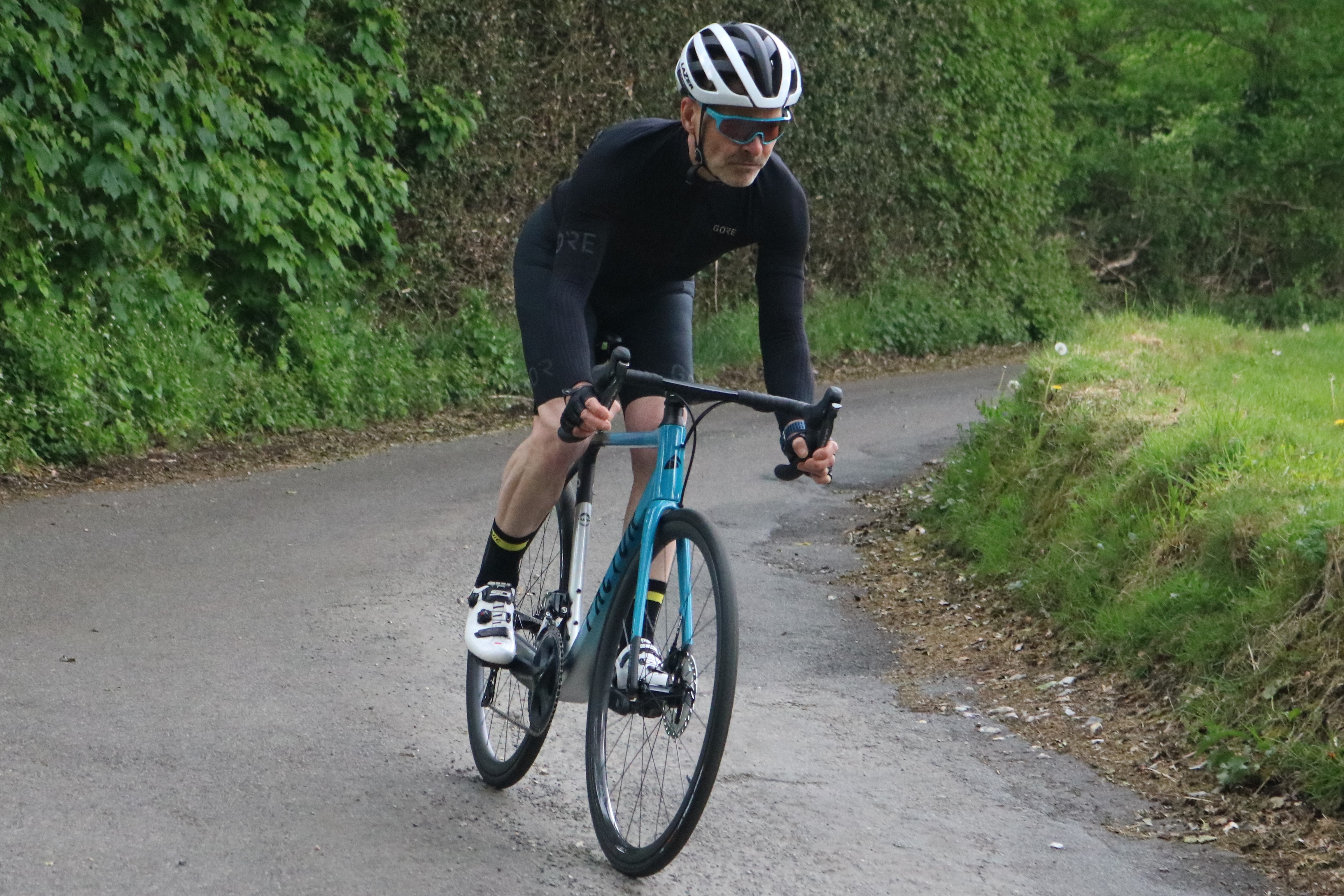
Pinarello has led further into the modern era of cycling with its first introduction into gravel riding. From the off the Italian brand has done an amazing job with its fully capable Grevil. We liked it so much, we put it in Editor's Choice alongside some of the brands other bikes.
Kudos to Pinarello. It could so easily have rested on the not-inconsiderable laurels of the Dogma F10, increased its clearance a bit and sold a shedload of “gravel lite” bikes.
It's not done that. Instead, with the Grevil and its pumped-up sibling the Grevil+, it's fully embraced gravel riding with a highly capable off road drop bar machine.
>>> Best bikes for backpacking
That starts with the decision to fit the bike out with 650b wheels with 47mm Vittoria Terreno Zero gravel tyres, for lots of air volume in a format that is similar in circumference to a 25mm tyre on a 700c wheel. There is also a third set of bottle cage mounts under the down tube, so you can take plenty of fluids with you on a longer, more distant adventure.
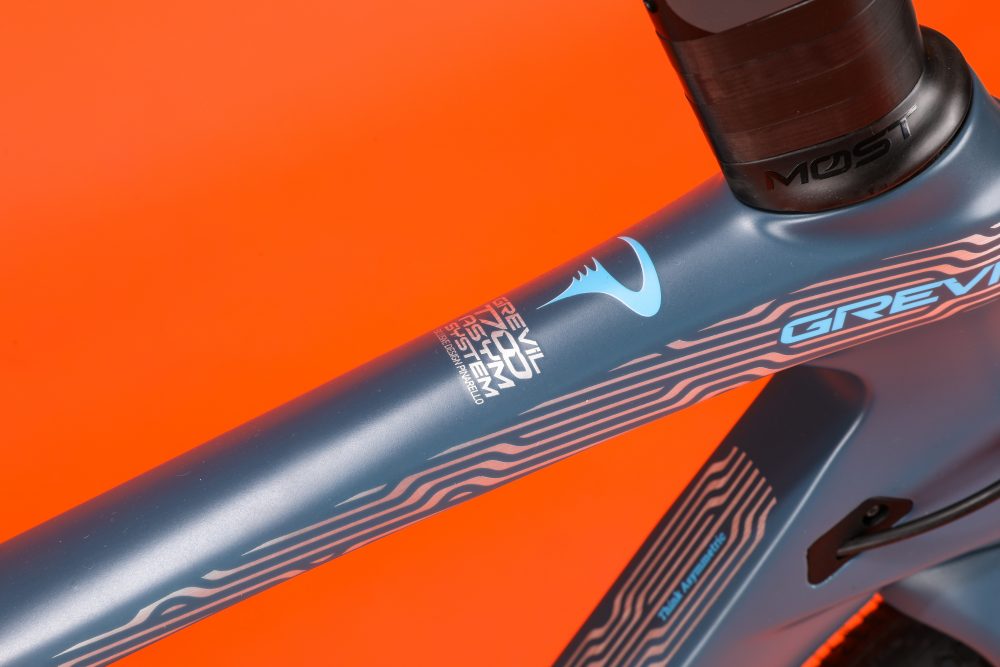
The Grevil’s geometry is tweaked for mixed terrain riding too, with the shorter reach and higher stack you’d expect for this type of bike. It’s not too upright though; we rode it with 40mm of spacers below the stem, so there’s the option to lower the bar significantly. The seat tube and fork angles have been reduced too, relative to Pinarello’s road bikes.
In contrast, the wheelbase is quite close to the brand’s racing bikes and the chainstays only 420mm long – features permitted by the adoption of 650b wheels and the geometry of the rear triangle.
But Pinarello hasn’t abandoned the design features that have led to the Dogma F10’s spectacular success. So the profile of the Grevil doesn’t look so dissimilar to its road racing cousin. That starts with the Onda aero fork with its Forkflaps at the dropouts designed to smooth airflow over the disc brake caliper and thru-axle. The left side flap is extra-large and also helps to shield the brake caliper against bashes.
But the fork is much wider than on the Dogma, allowing plenty of room for big tyres. And its two legs have different thicknesses, the left leg being chunkier to handle the disc brake. The head tube too has bulges in all the right places to look like that of a Dogma.
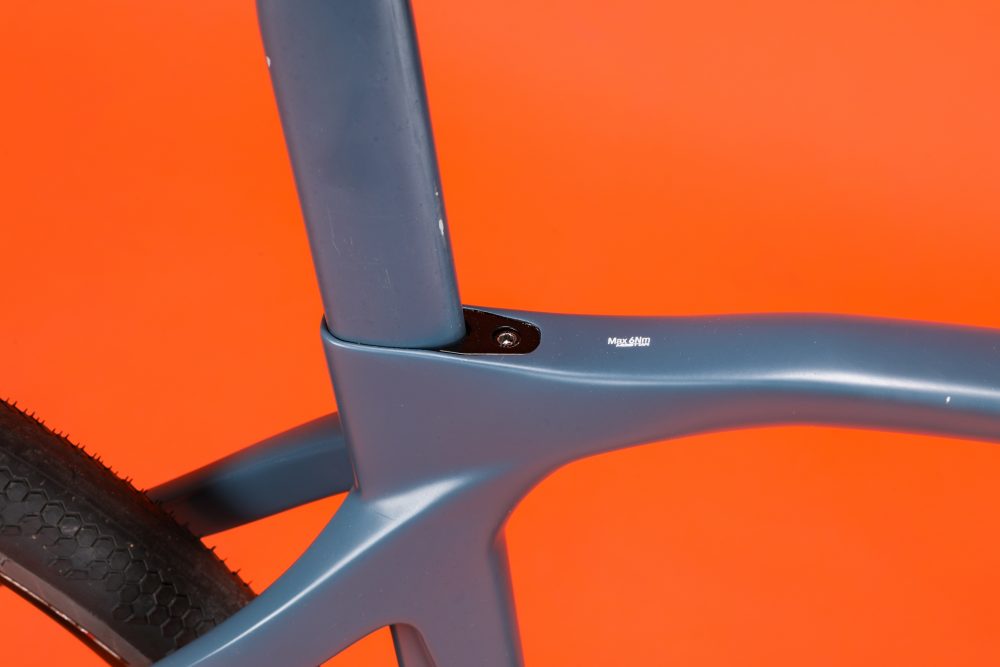
Move back to the down tube and this too borrows heavily from the Dogma F10, with a truncated aerofoil cross-section. And like that bike, there’s a depressed section where the bottle bosses are, to help shield of bottle from the wind and improve airflow. There’s also a slot for a Di2 junction box.
The seat tube too is aero and even has a cut-out for extra clearance for those big tyres and you get an aero seatpost, borrowed from the Dogma K10, and held in place by a recessed bolt in the top tube.
So far, the Grevil looks to follow the design of the Dogma F10, but with a lot more clearance. It’s once you get to the rear triangle that things get radical. Pinarello’s bikes are always asymmetric here. But in the case of the Grevil, the drive side and non-drive side stays look completely different.
Getting adequate clearance behind the bottom bracket shell is always difficult for a gravel machine, where you want to be able to fit a double ring chainset to give some higher ratios when riding faster on tarmac and smoother off-road, while keeping the chainstays short for lively handling.
Pinarello has adopted the usual solution here of dropping the drive side chainstay to provide the room for the chainset, while still letting you run wide tyres. The chainstay is also thinner behind the chainset than its opposite number on the non-drive side.
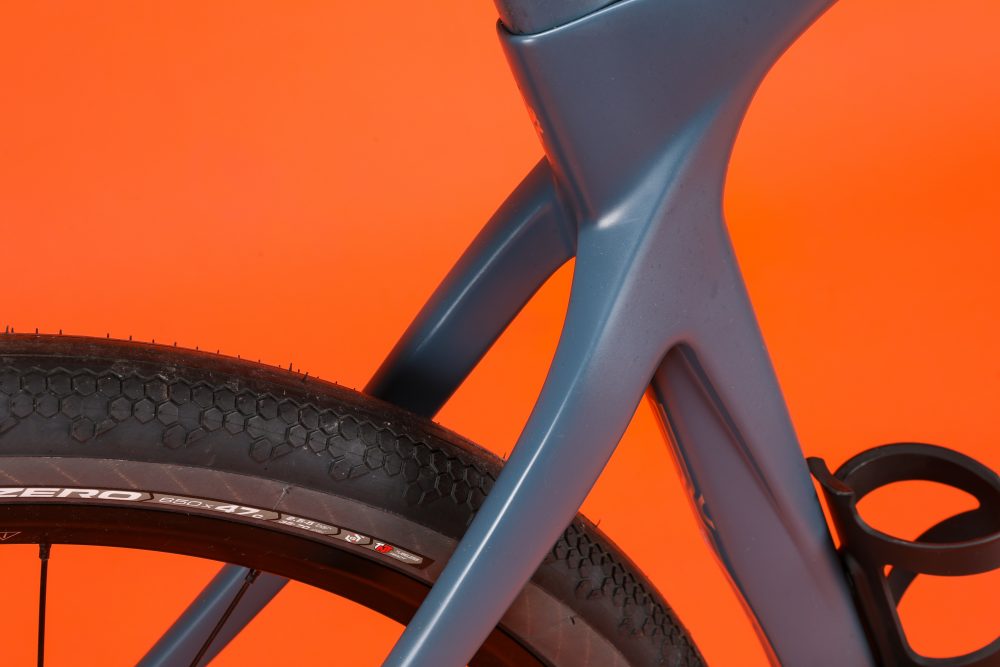
The seatstays follow completely different routes to the seat tube too. So the left seatstay is much less bowed and thicker than the right side one and meets the seat tube several millimetres further up. The seat tube too has a different shape on either side, with a groove on the right side not mirrored on the left.
It all looks a bit weird at first, but is designed to even out the forces acting differentially on the rear triangle between the drive side and non-drive side. The two sides of the rear triangle end up being roughly the same size, for similar stress distribution.
A spec for off-road use
The Pinarello Grevil comes with a Shimano Ultegra groupset, including an Ultegra RX clutched rear mech with long cage, which as we found when we tested it previously, does a really good job of suppressing chainslap when riding over bumpy surfaces. The 50/34 chainset is married to an 11-32 cassette for plenty of range – although not quite down to the 1:1 which can prove useful on a bike of this type. You also get Shimano 160mm heat sink rotors on the flatmount disc brakes for efficient cooling.
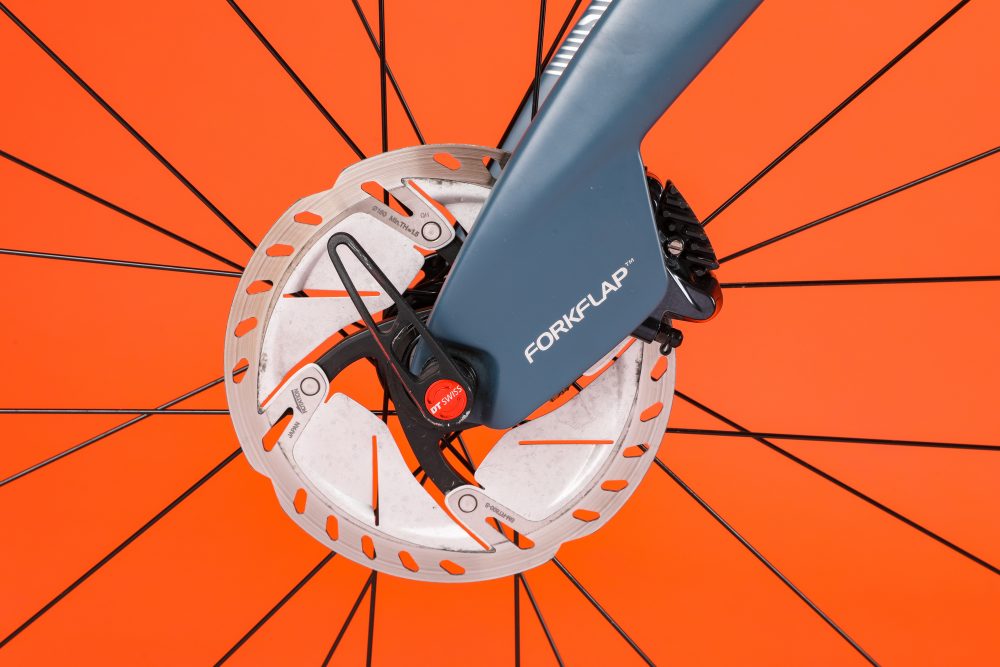
As well as the manual Ultegra option tested, there’s an Ultegra Di2 Grevil spec priced at £5500. The Grevil+ gets upgraded Torayca T1100G UD carbon fibre instead of the Grevil’s T700 fibre. It comes with a SRAM Force 1 11-speed mechanical groupset and is priced at £7000. Pinarello has stuck to a threaded bottom bracket, which makes for easy maintenance and creak-free running.
All the Grevils come with Fulcrum 650b wheels. The Racing 7B DB wheels on the bike tested can be run tubeless. They are sturdy, with J-bend plain gauge spoking, but not as sexily wide as some flashier wheelsets. The weight isn’t bad at a claimed 1670g though. But the 19mm internal rim width leads to quite a narrow, balloon-like stance to the Vittoria Terreno Zero tyres.
Those tyres are a great choice for off-road riding. Not only do they give plenty of air volume to ride over uneven surfaces, but they are seriously fast-rolling. That’s due to an absence of tread over the crown of the tyre, with just a couple of parallel grooves running around the circumference.
The sides of the tyre are composed of low profile hexagonal knobs, a larger version of those used in the Terreno Dry tyre. They’re slightly canted against the direction of travel, to help generate grip, without too much rolling resistance. It may have been luck, but even running tubed I did not get any flats when riding the Grevil over some rough terrain.
Most finishing kit comes from Pinarello’s in-house component brand. So there’s an alloy Most gravel bar, with a slight flare to the drops. That’s paired with a Most alloy stem – and even this is aero in profile with a streamlined top cap sitting over aero spacers.
The saddle too is from Most. It’s a short design. Although adequately padded, it would be nice on a bike of this type to have more length, so that it’s easier to shift your weight around over difficult terrain.
You don’t get the selection of mounting points for luggage, top tube bags or other kit that some gravel bikes like the new Mason ISO and Look 765 Gravel have. But most bikepacking bags don’t require mounts, as they attach to the bike with straps, so you can still carry plenty of kit on the Grevil.
Riding the Pinarello Grevil
The Grevil feels fast, both off road and on. I was in the large ring a lot more than I would usually be on dry dirt tracks and that was reflected in a series of PBs on off-road Strava segments. That’s probably down to the tyres’ slick central section, more than the frame’s aero features.
In the dry, there’s plenty of grip in the tyres when riding off road, although I could see that I was riding predominantly on the smooth central tread section, when the tyres were inflated to around 40psi. They slip around in the muddiest mud, but cope well with surface damp and the drier mud that’s more prevalent at this time of year and don’t suffer from clogging.
On tarmac sections, the big air volume adds some extra cushioning, without the Grevil feeling at all sluggish. I was able to climb well – again, not really using the full extent of the lower gear ratios. That’s despite the Grevil’s comparatively high 8.87kg weight. Fast downhills both on and off road felt stable and controlled, regardless of the surface, with the Ultegra hydraulic braking making light work of controlling my speed.
Along with the short saddle limiting fore and aft movement while seated, Pinarello’s bar tape is a bit thin and less comfortable than more squishy tape over rattly surfaces. But otherwise, there’s nothing to deflect from the Grevil’s excellent set-up for on/off-road adventures.
I also tried swapping out the rather utilitarian Fulcrum 650b wheels for something flashier. Although Pinarello claims that the Grevil will take 700c tyres up to 42mm, I was able to fit a set of 45mm WTB Riddler tyres on 25mm internal width Bontrager Aeolus Pro 3V rims.
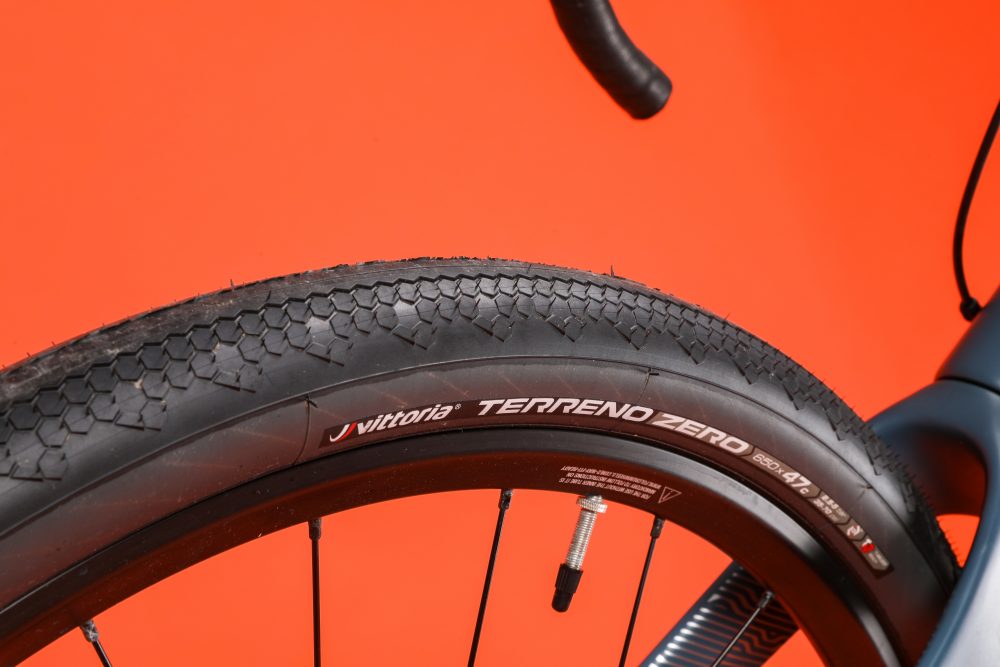
There was still masses of room at the forks. Although the rear tyre was quite tight, even with some mud accumulation on the tread, the wheel continued to turn just fine, although the tyre rubbed against the front mech cable end when in the large ring.
The Bontrager wheels livened things up a little, but not as much as I’d expected. That’s probably down to the extra tread on the Riddler tyres increasing rolling resistance in compensation for the lower wheelset weight.
Value
There’s no getting away from the Grevil’s pricetag – it’s at the premium end of the gravel segment. But compared to the Dogma F10, with which it shares many features and which comes in at around £10,000, you could argue that it’s a snip.
>>> Buy now: Pinarello Grevil Ultegra from Sigma Sports for £4500
Indeed, the Grevil comes in mid-range for a Pinarello and is comparable in price to the Prince, being undercut only by the GAN in the brand’s range. For the price, I’d prefer it over Pinarello’s mid-range road-going options. The Grevil is certainly no slouch on the road and its competence on mixed terrain adds the fun of riding off tarmac to what’s already an attractive package.

Thank you for reading 20 articles this month* Join now for unlimited access
Enjoy your first month for just £1 / $1 / €1
*Read 5 free articles per month without a subscription

Join now for unlimited access
Try first month for just £1 / $1 / €1
Get The Leadout Newsletter
The latest race content, interviews, features, reviews and expert buying guides, direct to your inbox!
Paul started writing for Cycling Weekly in 2015, covering cycling tech, new bikes and product testing. Since then, he’s reviewed hundreds of bikes and thousands of other pieces of cycling equipment for the magazine and the Cycling Weekly website.
He’s been cycling for a lot longer than that though and his travels by bike have taken him all around Europe and to California. He’s been riding gravel since before gravel bikes existed too, riding a cyclocross bike through the Chilterns and along the South Downs.
-
 'Alive and well' - decorated Paralympian found after gone missing in Vegas
'Alive and well' - decorated Paralympian found after gone missing in VegasSam Ruddock hadn't been heard from in 11 days, but has now been located
By Tom Davidson Published
-
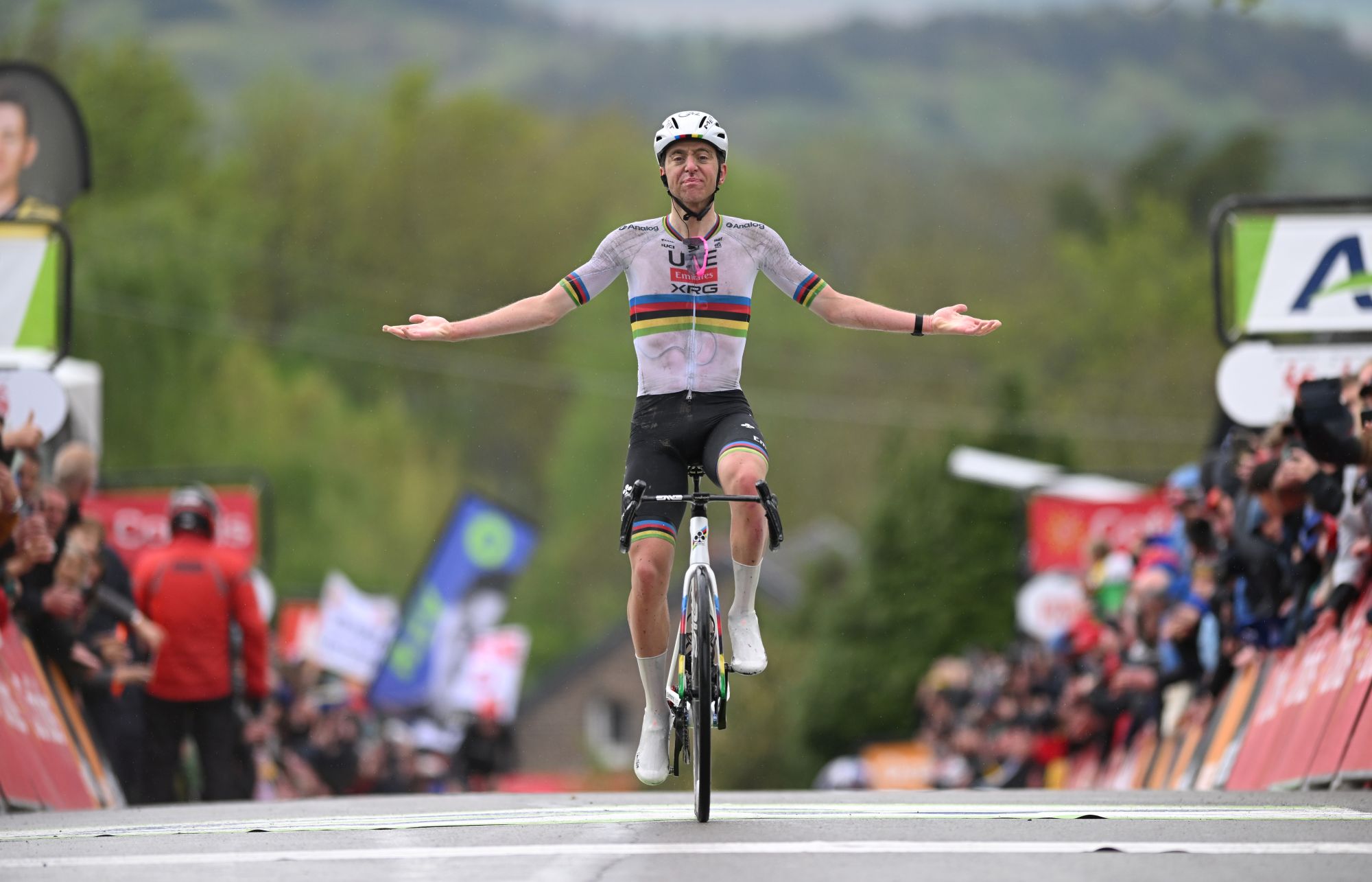 Tadej Pogačar was dominant at Liège-Bastogne-Liège, but I hope for a competitive Tour de France
Tadej Pogačar was dominant at Liège-Bastogne-Liège, but I hope for a competitive Tour de FranceThe Slovenian has finished on the podium of the last six Monuments, the first man to do so - when will he stop dominating?
By Tom Thewlis Published
-
 'Not bad for a sprinter' - Jason Kenny runs London Marathon in impressive time
'Not bad for a sprinter' - Jason Kenny runs London Marathon in impressive timeSeven-time Olympic gold medallist made marathon debut alongside former GB team-mate Becky James
By Tom Davidson Published